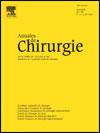Adénocarcinome hépatoïde de l'estomac. À propos d'un cas - 01/01/05

Résumé |
L'adénocarcinome hépatoïde de l'estomac est une tumeur rare et de mauvais pronostic. Le diagnostic, facile en cas d'élévation de l'alphafoetoprotéine sérique, est fait le plus souvent au stade de métastases lymphatiques et/ou hépatiques. En histologie, il s'agit d'un adénocarcinome de type intestinal contenant des foyers de différenciation hépatocytaire. L'étude immunohistochimique de ces foyers met en évidence des antiprotéases (alpha-1-antitrypsine et alpha-1-antichymotrypsine) et une sécrétion d'alphafoetoprotéine (AFP). Nous rapportons le cas d'un homme de 66 ans présentant un adénocarcinome hépatoïde de l'estomac, traité par gastrectomie et chimiothérapie. L'évolution a été marquée par une rapide progression de la maladie avec décès par hépatomégalie métastatique quatre mois après le diagnostic.
Le texte complet de cet article est disponible en PDF.Abstract |
Hepatoid adenocarcinoma of the stomach is a very rare tumor with a poor prognosis. Lymph nodes involvement and/or liver metastases are frequently observed. Diagnosis should be pointed out if elevated serum level of alpha-fetoprotein (AFP) is detected with gastric tumor. Histologically, the tumor is an adenocarcinoma of intestinal type including foci of hepatoïd differenciation. Immunohistochemistry is positive for alpha-1-antitrypsin and alpha-1-antichymotripsin, and for AFP. We report a case of a 66 year-old man presenting an advanced stage of hepatoid adenocarcinoma of the stomach, treated by gastrectomy followed by chemotherapy. The patient died four months after the surgery because of progressing liver metastatic disease.
Le texte complet de cet article est disponible en PDF.Mots clés : Cancer de l'estomac, Adénocarcinome hépatoïde, Alphafoetoprotéine
Keywords : Gastric cancer, Hepatoid adenocarcinoma, Alphafoetoprotein
Plan
Vol 131 - N° 3
P. 213-215 - mars 2006 Retour au numéroBienvenue sur EM-consulte, la référence des professionnels de santé.

